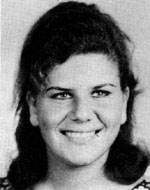Daughter of Wolf and Camilla. She was born on February 27, 1950 in Wroclaw, Poland, where her family immigrated to Israel in 1957. Chava did not know the language of absorption and for a short time learned to speak fluently in the language of the country, The “Nevo” elementary school, where she would prepare without any help because she did not need her, then attended the Tel Aviv Municipal High School, where she had grown up in elementary school She began to move away from her home and wanted to live her life independently, when she was not under the constant supervision of her parents. To its new surroundings, whether it is the camp atmosphere during its vacation in the summer or in the camps or in the Gadna. She was always Simcha, cheerful, smiling and acquiring the friendship of everyone around her. She had developed a social sense and knew how to make friends with new friends and friends. When she was in a labor camp at Kibbutz Yagur, she made contact with the kibbutz girl, a friendship that lasted for years. Chava loved to participate in tours and would sing her new Hebrew songs aloud, and even her father’s songs in Polish, Russian and French. During her high school years, she stopped her piano lessons, which she continued for six years, but she did not want to give up the movement. As she grew older, she would sit up late in discussions with her friends about the essence of life, social problems, and love. School was no longer the main subject in her life and eyes were her parents “old” generation who does not understand and can not understand the new problems of life – especially the younger generation. Yet her home was the place for social gatherings and her mother remained the friend to whom she could tell her young Lev. In the last two years of her high school studies, the studies became more difficult and the difficulties encountered in various subjects became apparent. But Hava did not want any help and when there was some misunderstanding between her and one teacher or another she would not let her parents interfere because she was naturally optimistic and sure that everything would work out. During the period of tension before the Six-Day War and during the war itself, Hava, with her friends and friends, came to the aid of the Yishuv and did everything she could. She worked in a hospital, donated blood to wounded soldiers, gave her hand to the mail and even dug trenches. At the end of the war, Chava stood in the matriculation exams, finished her studies, and decided to go out and see the world. She had a difficult struggle with her parents and finally agreed to go on an independent trip to the United States, to her large family, who welcomed her as she arrived there. In the United States, a new world was revealed to her: she absorbed new impressions, found new friends, visited large and important cities-and her letters home were full of excitement and impressions. But with great joy Hava returned to her home – and to the army, who called her a chance she would be exempt from military service and her parents wanted to persuade her to continue her studies at the university; But Hava did not want to hear about it and said that she would do her duty as well as the others, and that she had submitted a request for early recruitment – which she encountered; In December 1967, even though she was under 18, she wore the IDF uniform. She completed a ciphers course and a course of auxiliary services for pilots and was assigned to the air force. All her work in the IDF was kept as a military secret, and only after the fall did the parents learn from her commanders that her job was responsible and she filled it wisely and with devotion. The base is Jerusalem and there were those who cameAs well as companies that served with her – and thus became friendly friends. When she came home, the house would fill up with friends who came to visit her and they would talk about her, and she would come to visit her. Various subjects; The house was full of joy of laughter and good cheerful cheer, because she loved life and the bustle of life. She had many plans for the future and she dreamed of studying at the university and about the family she would establish in the future. She came home recently on January 12, 1969, because she wanted to take her dress, which in two days was about to be worn for her friend’s wedding. This was two days before she fell, because on the 14th of Tevet 5719 (14.1.1969) Hava went out in the afternoon in a military van and on the same journey she found her death. Was laid to rest in the military cemetery on Mount Herzl in Jerusalem. Not far from her was her cousin, Daniel Trainin, who fell in the Six-Day War to liberate Jerusalem. A monument in her memory was erected in the courtyard of the municipal school of Ma’aseh by the sculptor Tumarkin. The Foundation for the Commemoration of Hava was established to issue a pamphlet on the road to road safety. A book in her memory, including her history and her friends’ stories about her, was published in Tel Aviv by her parents and friends.
